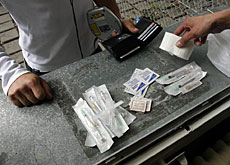
Strengthening survival help for drug addicts

Parliament is due to launch a new debate this week over Swiss drugs policy, examining heroin prescription and increased prevention efforts.
The proposal to be debated in the House of Representatives comes more than two years after a controversial attempt to decriminalise cannabis was rejected.
“We need a proper legal basis on a national level. Otherwise differences continue to exist between the country’s 26 cantons,” says Ruth Humbel of the centre-right Christian Democratic Party.
Politicians are trying to avoid a repeat of 2004 when one chamber of parliament refused to even discuss government-sponsored plans to liberalise the use of cannabis as part of an overhaul of the drug law.
Humbel says the new proposal is an attempt to save the less-disputed elements of the rejected bill.
The aim is to enshrine the so-called four-pillar principle of prevention, survival help, therapy and repression introduced at the beginning of the 1990s. The law notably paves the way for public injection rooms and the distribution of needles to prevent the spread of HIV/Aids.
“I think we should be able to find a majority for the proposals among the main parties. But there will be opposition, particularly from the right, over the issue of heroin prescription for addicts, as well as over whether the goal of abstinence will be included in the law,” says Humbel.
For their part, the centre-left Social Democrats, which are known for their liberal stance on drugs, have described the bill as “a small step in the right direction”.
The Institute for the Prevention of Alcohol and Drug Problems agrees with a pragmatic approach and highlights the importance of a legal consolidation of the four-pillar policy after the failure of a more ambitious bill.
“The aspect of therapy and prevention are key for us,” says spokeswoman Janine Messerli.
Success
For Felix Gutzwiller, professor of medicine and member of the centre-right Radical Party, there is enough evidence to prove the success of Switzerland’s drug policy.
“The number of drug-related deaths is decreasing; there are fewer cases of HIV/Aids and hepatitis among addicts in Switzerland.”
He points out that there are no more major public drug scenes in cities and progress is being made in re-integrating addicts into society.
The Federal Health Office adds that the measures already in place in certain cantons have had a positive impact.
“Injection rooms help reduce the problems of the public drug scene, and contribute to better health and social re-integration of addicts,” says Martin Büechi, prevention expert at the health office.
Medical
The use of cannabis would only be allowed for medical purposes, but there is no mention of decriminalising psychoactive hemp on a general level.
“Consensus on cannabis liberalisation is not possible,” says Toni Bortoluzzi of the rightwing Swiss People’s Party.
He adds that a people’s initiative is pending which calls for a new plan to decriminalise cannabis under certain conditions, such as a licensing system for sellers as well as age limits for young pot smokers.
The initiative is just one way of relaunching the debate on cannabis, according to Gutzwiler. He says parliament could eventually draft its own proposal, if there is no consensus.
Parliament must not sit on the fence for ever, they have to take a stance on the issue of cannabis, adds Messerli.
Switzerland has one of the highest rates of young pot smokers in Europe. There are about 225,000 occasional or regular cannabis consumers, according to official estimates.
In the 1980s and 1990s Switzerland became notorious for its liberal narcotics policy, including the public drug scenes in the country’s major cities.
swissinfo, Urs Geiser
There are about 22,000 regular heroin users in Switzerland, according to the Federal Health Office.
About 1,300 addicts are being treated in medically controlled heroin programmes.
An estimated 16,000 addicts receive methadone under medical supervision.
About 225,000 people are considered regular or occasional pot smokers, while more than 500,000 have tried cannabis at least once in their lives, the authorities say.
The federal authorities introduced the four-pillar policy: prevention, survival help, therapy and repression, in the early 1990s.
Parliament rejected a bill in June 2004 to decriminalise the consumption and possession of cannabis for personal use.
A people’s initiative, handed in by a group of politicians and drugs experts in January 2006, wants to allow the use of cannabis under strict rules, including an age limit and a licensing system for shops selling psychoactive hemp.

In compliance with the JTI standards
More: SWI swissinfo.ch certified by the Journalism Trust Initiative
















![The four-metre-long painting "Sonntag der Bergbauern" [Sunday of the Mountain Farmers, 1923-24/26] had to be removed by a crane from the German Chancellery in Berlin for the exhibition in Bern.](https://www.swissinfo.ch/content/wp-content/uploads/sites/13/2025/12/01_Pressebild_KirchnerxKirchner.jpg?ver=cb688ed5)















You can find an overview of ongoing debates with our journalists here . Please join us!
If you want to start a conversation about a topic raised in this article or want to report factual errors, email us at english@swissinfo.ch.